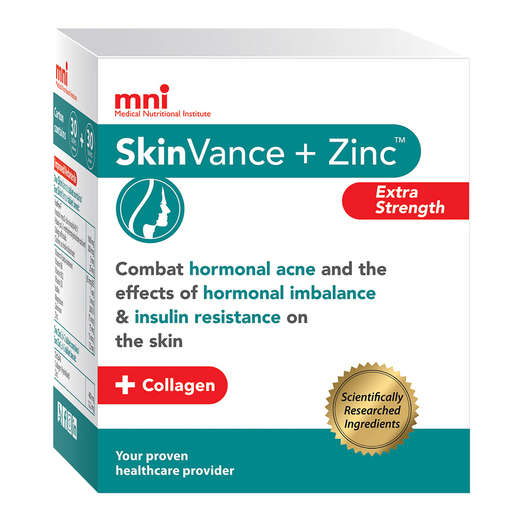SkinVance + Zinc can be used by anyone who is experiencing poor skin health as a result of hormonal imbalance or change (during teen years or menopause), poor blood sugar control or some combination of the two. SkinVance + Zinc is ideal for those who are trying to improve their skin quality, as well as an assistive therapy to active medical treatment for acne.
You should not take SkinVance + Zinc if you are hypersensitive or allergic to any of the active or inactive ingredients of SkinVance + Zinc. Do not take SkinVance + Zinc if you are pregnant or breastfeeding.
SkinVance + Zinc contains a unique blend of plant-derived phytochemical ingredients and nutrients that optimise skin health, combat hormonal acne, and alleviate skin inflammation in the presence of Insulin resistance.
For males and females.
Inositol
Inositol is a naturally occurring compound related to the vitamin B family. Chemically, it occurs in different molecular structures (stereoisomers) of which myo-inositol (MI) and D-chiro-inositol (DCI) are the most biochemically active. Inositol plays a critical role as a cofactor in several reproductive and metabolic hormone signalling pathways, including insulin, thyroid, androgen, and gonadotropin.
Extensive research has documented the beneficial role of inositol supplementation on the alleviation of insulin resistance in patients with Polycystic ovary syndrome (PCOS). This includes marked improvements in acne outcome scores observed in both adolescent and adult-onset acne.
Collagen
Collagen is the main structural protein in the body's various connective tissues and forms a dominant part of skin. It has a long history of medical use in cosmetic and burn surgery and is commonly used as a supplement to enhance skin and joint health. Research has indicated that collagen supplementation assists with general skin health and wound healing.
French Lilac (Galega officinalis)
Galega officinalis is an herbaceous plant native to parts of Europe, western Asia, and northern Africa. Besides growing wildly, it is also cultivated for ornamental purposes, as a forage crop and as a bee plant dedicated to honey production. G. officinalis contains a rich source of phytochemicals. Research into these has led to the discovery of metformin, one of the most famous diabetic and beneficial diabetic drugs, which is still the gold standard for type 2 diabetic treatment in the world.
Zinc
Zinc is a mineral that acts as a cofactor in hundreds of different enzymatic reactions. Several clinical trials have demonstrated the benefits of zinc supplementation in the treatment of both acne vulgaris and hidradenitis suppurativa. Low levels of zinc have also been directly correlated to the presence and severity of acne, while zinc supplementation has demonstrated a converse effect. Several mechanisms of action are involved, which include the inhibition of inflammatory mediators (such as nitric oxide), integrin, and toll-like receptor expression by keratinocytes. Zinc also inhibits the activity of the enzyme 5-reductase, which blocks the conversion of testosterone to dihydrotestosterone (DHT), a major contributing factor in acne formation.
Folate, Vitamin B6 and B12
These act as cofactors or catalysts for key metabolic pathways required in cell development and optimal skin health.
Choline
Choline phospholipids are necessary components in cell membranes and are required to restore the elasticity and suppleness of skin.
Vitamin A
Vitamin A suppresses the formation of white- and blackheads (comedogenesis) through an inhibitory effect on sebaceous gland activity and sebum secretion. Studies in individuals with acne have shown that vitamin A levels in the skin are often reduced. Vitamin A levels in skin are also inversely correlated with the degree of severity of pustular acne.
Vitamin D
Research has suggested a strong connection between vitamin D levels and the severity of acne and hidradenitis suppurativa (HS), a chronic inflammatory skin ...

